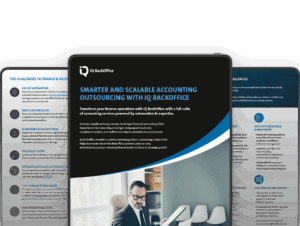
Introduction
Running a business involves many complex tasks, including financial management. Not all companies have the expertise or resources to manage their financial operations effectively. This is where outsourcing financial operations can come in handy. Outsourcing can help businesses control costs, improve efficiency, and have specialized access to expertise. But how do you know when it’s the right time to consider outsourcing your financial operations? In this article, we’ll explore the signs that indicate outsourcing may be the right choice for your business.
1. Lack of Expertise
One of the critical signs that it may be time to consider outsourcing your financial operations is a need for in-house expertise. Managing financial operations can be complex and requires specialized tax preparation, financial reporting, and auditing knowledge. If your business needs to gain the in-house expertise to handle these tasks effectively, outsourcing can provide access to specialized expertise.
Outsourcing providers typically employ accounting professionals with expertise in various areas of accounting, which means businesses can tap into this expertise without having to invest in additional training or hiring staff with these specialized skills. Outsourcing providers can also provide access to the latest accounting software and technology, which can be valuable for businesses that may need more resources to invest in these tools.
2. Inefficiencies in Financial Operations:
3. Rapid Growth
If your business is experiencing rapid growth, you may need to scale up your financial operations quickly to keep pace with the increased demand. However, hiring and training staff can be time-consuming and expensive and may not be feasible for businesses that need to scale up quickly.
Outsourcing can provide the flexibility to quickly scale up or down as needed without hiring or laying off staff. Outsourcing providers can easily adjust their services to meet the changing needs of their clients, which means businesses can add or remove accounting services as needed.
4. Cost Savings
Another sign that it may be time to consider outsourcing your financial operations is the need to control costs. Maintaining an in-house accounting department can be expensive, with associated costs such as salaries, benefits, and office space. Outsourcing can provide significant cost savings compared to an in-house team.
Outsourcing providers can leverage economies of scale to provide accounting services at a lower cost than an in-house team would be able to. Outsourcing providers can spread their costs across multiple clients, lowering overall costs for each client.
5. Compliance and Regulatory Requirements
If your business is subject to complex regulatory requirements, such as tax laws or accounting standards, outsourcing can provide access to specialized expertise and ensure compliance with these requirements. Compliance with regulatory requirements is critical for businesses, as failure can result in significant fines and penalties.
Outsourcing providers typically employ accounting professionals with specialized expertise in various areas of accounting, including regulatory compliance. This means businesses can tap into this expertise without investing in additional training or hiring staff with these specialized skills.
6. Need for Advanced Technology
If your business requires advanced accounting software or technology that you do not have in-house, outsourcing can provide access to the latest tools and technology. Outsourcing providers can often give access to the latest accounting software and technology, which can help businesses stay up-to-date with the latest accounting standards and best practices.
In addition, outsourcing providers may have more advanced technology and tools than businesses have in-house. This can be valuable for businesses that may need more resources to invest in the latest accounting software and technology on their own.
How to Determine When To Outsource Your Financial Operations
Identify Your Needs
Identifying your needs is the first step in determining whether outsourcing is right for your business. This involves evaluating your current financial operations and identifying any inefficiencies, areas where you lack expertise, and any other areas where outsourcing could provide value.
For example, outsourcing may be the solution if you are experiencing delays in financial reporting or need more expertise to handle complex tax requirements. You can determine whether outsourcing would provide value for your business by identifying your needs.
Evaluate the Costs and Benefits
Once you have identified your needs, the next step is to evaluate the costs and benefits of outsourcing. This involves considering the potential cost savings, access to specialized expertise, improved efficiency, and other uses of outsourcing.
It is essential to consider the potential risks and challenges associated with outsourcing, such as data security concerns or difficulties with communication and collaboration with the outsourcing provider. By evaluating the costs and benefits, you can determine whether outsourcing would provide a positive return on investment for your business.
Research Outsourcing Providers
If you determine that outsourcing is the right choice for your business, the next step is to research outsourcing providers. Selecting a reputable outsourcing provider with a proven track record of providing high-quality accounting services is essential.
When researching outsourcing providers, consider the provider’s experience, expertise, technology, and security protocols. In addition, it can be helpful to read reviews and testimonials from other businesses that have worked with the provider.
Develop a Partnership
Once you have selected an outsourcing provider, the final step is to develop a partnership. This involves establishing clear communication channels, setting expectations, and creating a plan for managing your financial operations.
It’s important to establish regular communication with the outsourcing provider, including regular check-ins and updates. This can help ensure that the outsourcing provider meets your expectations and promptly addresses any concerns.
It’s crucial to establish transparent processes and protocols for managing your financial operations. This includes setting clear roles and responsibilities, creating deadlines and milestones, and developing a plan for governing data security and confidentiality.
Outsourcing financial operations can significantly benefit businesses, including cost savings, access to expertise, improved efficiency, and scalability. However, it’s essential to carefully evaluate outsourcing costs and benefits and select a reputable outsourcing provider with a track record of providing high-quality accounting services.
By following these steps, businesses can determine whether outsourcing is suitable for their needs, select a provider that meets their requirements, and establish a successful partnership for managing their financial operations. Ultimately, outsourcing can help businesses to focus on their core competencies and strategic initiatives while leaving their financial operations in the hands of experts.
Are You Considering Outsourcing Your Financial Operations? IQ BackOffice Can Help.
Here at IQ BackOffice, we provide financial business process outsourcing for large and mid-sized enterprises. We serve a range of diverse industries, including manufacturing and distribution, healthcare and dental, restaurant and hospitality, energy, retail, and technology. Our solutions enable companies around the globe to automate and streamline the complex financial processes they manage.
IQ BackOffice reengineers financial processes to take advantage of best practices and leverage state-of-the-art automation. This allows us to remove manual or inefficient steps, delivering improved controls and up to 70% cost savings for our clients. To learn more about how IQ BackOffice can reduce costs and streamline your Accounts Payable function, contact us.
Outsourcing Financial Operations: FAQs
Read More about IQ BackOffice offerings:
The Future of Business Payments – 5 Post-Pandemic Best Practices
Business Process Outsourcing, and a Closer Look at Accounts Payable
Accounting Automation and Outsourcing – Top 5 Rookie Mistakes
What is AP Automation and Does It Work On It’s Own?
Outsourcing Accounting Processes – Does It Actually Save Money?







